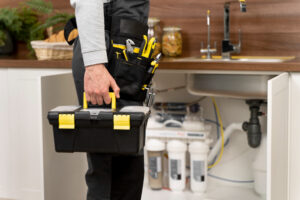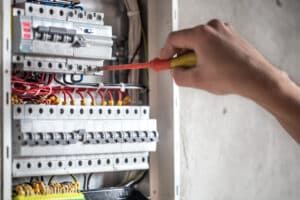Top 5 Tools Every Plumber Should Have in Their Toolbox
Introduction: Being a plumber requires a unique set of skills,...
Tankless water heaters, often heralded as the future of home water heating, have gained popularity for their promise of energy efficiency and endless hot water supply. However, like any significant home investment, they come with their own set of advantages and disadvantages. If you’re considering upgrading your water heating system, it’s essential to weigh the pros and cons to determine if a tankless water heater is right for you.
1. Energy Efficiency
One of the primary financial advantages of tankless water heaters is the reduction in utility bills. Tankless water heaters eliminate the need to maintain a large tank of hot water, heating water only when needed. This on-demand approach translates to significant energy savings. According to the Department of Energy, tankless water heaters can be 24% to 34% more energy-efficient than traditional storage tank water heaters for households that consume 41 gallons or less of hot water daily. Even for homes with higher hot water usage, around 86 gallons per day, tankless water heaters still offer a notable energy efficiency improvement, ranging from 8% to 14%. This efficiency not only lowers monthly utility costs but also reduces the overall environmental impact, making tankless water heaters a smart and sustainable choice for many households.
2. Endless Hot Water
For families or households that consume large amounts of hot water, tankless water heaters provide a continuous supply. There’s no fear of running out of hot water in the middle of a shower or while doing laundry. As long as there is water flow and power, a tankless system will heat water endlessly.
3. Space Saving
Tankless water heaters are significantly smaller than traditional tank heaters. They can be mounted on walls or installed in tight spaces, freeing up valuable floor space. This feature is particularly beneficial for smaller homes or apartments where space is at a premium.
4. Longer Lifespan
On average, tankless water heaters last longer than traditional tank heaters. While a conventional water heater typically has a lifespan of 10-15 years, a tankless system can last up to 20 years or more with proper maintenance. This extended lifespan can offset the initial higher cost over time.
1. Higher Initial Cost
The most significant drawback of tankless water heaters is their higher upfront cost. The purchase price of a tankless unit is generally higher than that of a traditional tank heater. Additionally, installation can be more complex and expensive, especially if your home requires upgrades to accommodate the new system, such as venting or electrical work.
2. Inconsistent Water Temperature
While tankless water heaters are designed to provide endless hot water, they can sometimes struggle to maintain a consistent temperature when multiple fixtures are in use simultaneously. For instance, if someone is taking a shower while the dishwasher is running, the system might not be able to keep up with the demand, leading to fluctuating water temperatures.
3. Limited Hot Water Output
Although tankless water heaters provide a continuous supply of hot water, there is a limit to how much hot water they can produce at once. Larger households with high simultaneous hot water demands might need to install multiple units to ensure an adequate supply, which can further increase costs.
4. Maintenance Requirements
Tankless water heaters require regular maintenance to operate efficiently. Hard water can cause mineral buildup in the system, reducing efficiency and lifespan. Homeowners need to flush the system annually or more frequently in areas with very hard water to prevent scaling and maintain optimal performance.
Tankless water heaters offer numerous benefits, including energy efficiency, space savings, and a longer lifespan. However, they also come with higher initial costs, potential for inconsistent water temperature, and regular maintenance requirements. Carefully consider your household’s hot water needs, budget, and willingness to perform routine maintenance when deciding if a tankless water heater is the right choice for your home. By weighing the pros and cons, you can make an informed decision that best suits your lifestyle and financial situation.

Introduction: Being a plumber requires a unique set of skills,...

Introduction: As technology advances and our reliance on electronic devices...

Introduction: Embarking on do-it-yourself (DIY) plumbing projects can be a...

Electricity is an indispensable part of modern living, powering our...

Green Plumbing: Sustainable Practices for a Greener Home In the...

Ensuring the safety and reliability of your home’s electrical system...